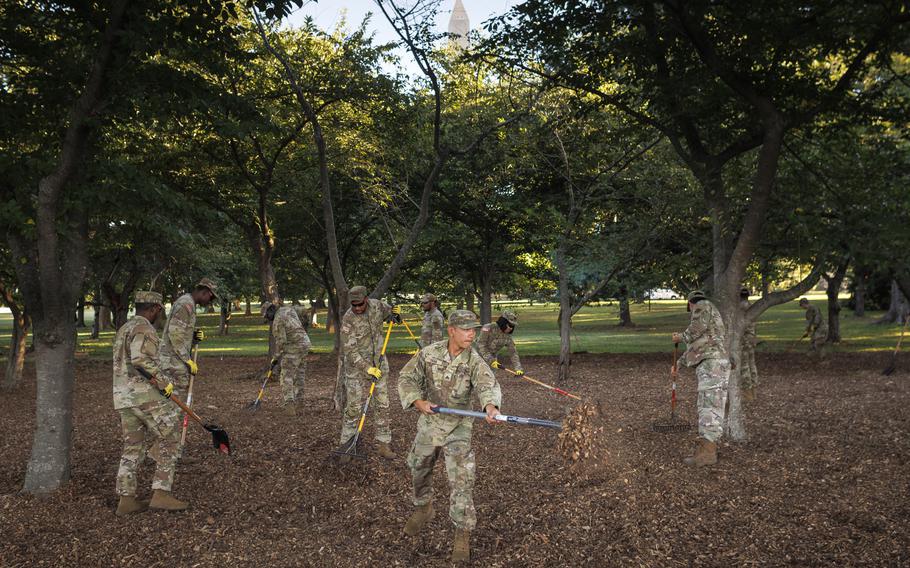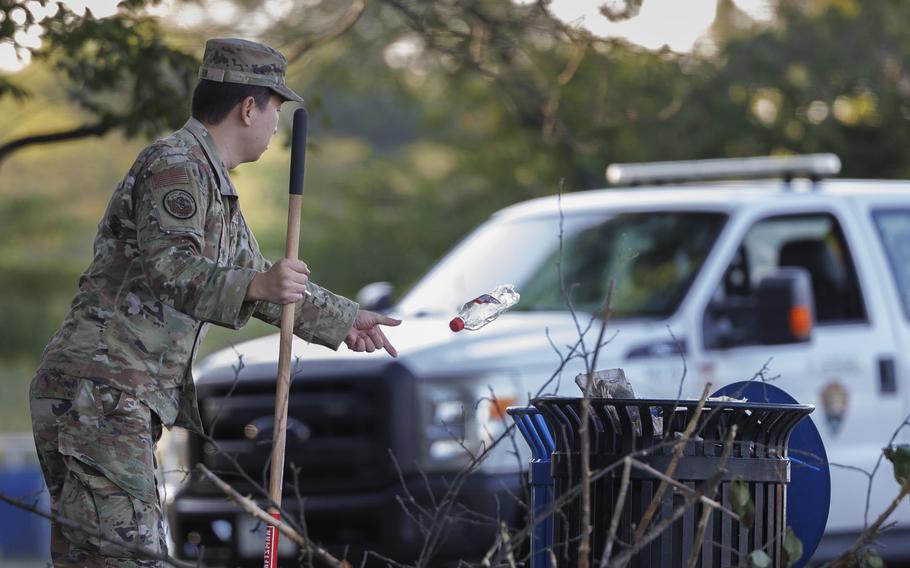
National Guard troops spread mulch around the Tidal Basin on Tuesday morning in Washington. (Tom Brenner/For The Washington Post)
The August air was crisp Tuesday as members of D.C’s National Guard, a key component of President Donald Trump’s federal takeover of the District, scooped, spread and smoothed mounds of mulch around the city’s treasured Tidal Basin cherry trees.
As they raked, specks of dirt and mulch floated upward into early morning sunbeams, an idyllic image starkly at odds with the president’s portrayal of Washington as a violent, lawless dystopia. The assignment was atypical for these troops, who more often are called on to respond to emergencies or deploy overseas, and it left some questioning if landscaping should be a military mission at all.
“I think it’s nice, as a D.C. resident,” said one Guard member. “But there are different things we could be doing.”
More than 2,200 troops, some from as far away as Mississippi and Louisiana, have been deployed in D.C. since Trump’s declaration of a “crime emergency” here. Ostensibly, they were mobilized to support federal law enforcement and local police, but in recent days those orders have expanded to encompass “beautification” tasks such as trash removal and groundskeeping around the National Mall and other federal property. Service members may work on removing graffiti, too.
Typically, custodial work like this falls to the National Park Service, which was already facing staffing shortfalls when the Trump administration this spring directed additional cuts as it gutted the federal workforce. The service used to have 200 people assigned to maintain thousands of acres of trees and gardens in D.C., and now there are 20, a Park Service official told The Post.
“It’s everybody — the masons, the maintenance workers, the groundskeepers, the plumbers. Every shop is short,” said the official, who, like others, spoke on the condition of anonymity, citing a fear of reprisal.
So the National Guard is picking up the slack. But that is raising concerns among some troops and critics of the Trump administration’s moves in D.C. who worry that employing them this way will come at a cost.
The Guard’s new duties in D.C. appear at odds with Defense Secretary Pete Hegseth’s laser-focus on preparing the military to fight and win wars. Late last year, as he sought to win the Senate’s support for his nomination, Hegseth, a former National Guard officer and Fox News personality, spoke forcefully about his desire to recenter the Pentagon’s attention on “lethality, lethality, lethality.”
“Everything else is gone,” he told reporters in December. “Everything else that distracts from that shouldn’t be happening.”
Representatives for Hegseth did not address questions about the new beautification assignment, or whether it was in line with the secretary’s lethality push. In a brief statement, the Pentagon’s chief spokesman, Sean Parnell, said the Defense Department “is incredibly proud of our D.C. National Guardsmen and their work to make DC Safe and Beautiful Again.”
Joint Task Force-D.C., which has overseen the Guard’s activities in Washington since Trump declared the crime emergency Aug. 11, said that service members will be working on more than 40 “beautification projects” throughout the city that were identified with input from local and federal agencies. Though the Pentagon has authorized those participating in the deployment to carry weapons, for now troops on cleanup duty will not be armed, an official with the task force said.
National Guard troops frequently get called in to support communities after major disasters and, on occasion, they do perform sanitation work. For example, during the coronavirus pandemic, Guard troops supported waste collection efforts to help slow the deadly virus’s spread.
It’s also not unusual for troops to be assigned cleanup duties on their bases, said Army veteran Kris Goldsmith. A video posted to Instagram by the D.C. National Guard, which shows troops rounding up trash, “is the most accurate recruiting video I’ve ever seen,” he said.

A service member discards a plastic soda bottle during a cleanup assignment at the Tidal Basin in Washington on Tuesday. (Tom Brenner/For The Washington Post)
New 18-year-old soldiers spend a lot of time walking across fields and parking lots, ordered to pick up butts of cigarettes they did not smoke because it builds discipline, Goldsmith said. But for older, career Guard members, such assignments are “not worth taxpayer dollars,” he said.
In the last two decades, the National Guard has fought in Iraq and Afghanistan, braved wildfires and plucked civilians from raging floodwaters. The repeat use of the force both domestically and abroad has raised concerns that it has been deployed too frequently as the easy option when it should be the option of last resort.
“For years this country has not invested in its infrastructure or its social safety net,” but it has invested in the military, said Chris Purdy, an Iraq War veteran who served for eight years in the National Guard. “It becomes very easy for policymakers on both sides to say ‘Oh, the Guard will fix it.’”
As the Trump administration considers expanding these domestic deployments to other major cities, Purdy, who now runs the Chamberlain Network, a pro-democracy veterans organization, said officials should be mindful of the implications for unit readiness.
Pulling Guard members — civilians often with full-time jobs who report for duty once a month and then for two weeks a year — for such missions comes with a trade-off. The time they would have spent focusing on training in their military specialty or participating in battle drills may be spent on groundskeeping or urban foot patrols instead.
Master Sgt. David Bowden has been part of both efforts. When he and other members of the D.C. National Guard were first activated about two weeks ago, Bowden was on a foot patrol along Constitution Avenue when he and other soldiers saw a D.C. police officer be assaulted by a driver she had stopped.
“It looked like a routine traffic stop,” Bowden said. Then the suspect “got out of the vehicle and took her down in front of us,” throwing her to the ground.
Bowden and three other Guard members chased the suspect on foot until they caught him, and one of the members, a military police officer, handcuffed him. The deployment has been quiet since then, he said.
Bowden said he and the other Guard members who participated in Tuesday’s mulching assignment were glad to help with the Tidal Basin cleanup. But still, it’s raising concerns about how to maintain the units’ readiness.
“It’s a question,” Bowden said, that “I and a lot of other higher enlisted are asking.”